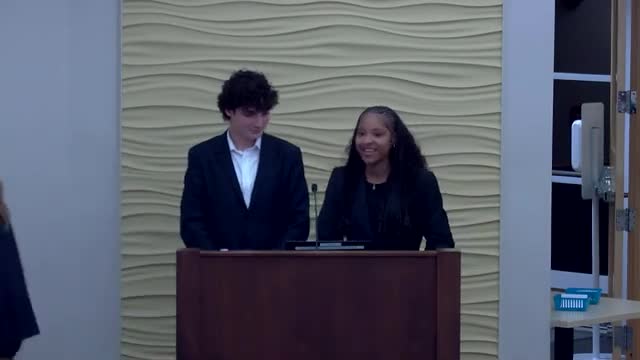Student ambassadors press board for advisory changes, propose teacher pass and testing center

Summary
Student representatives told the Board of Education the Superintendent Ambassador Program has produced changes — common finals for core math and security adjustments — and recommended concrete changes to the advisory period including a teacher pass system, testing center and peer tutoring.
Two student representatives presented the Superintendent Ambassador Program to the Birmingham Board of Education on Jan. 6 and laid out successes and specific proposals to improve the district advisory period.
Kennedy Cook and Owen Rabschide, identified as the student representatives and superintendents’ ambassadors, described three goals: explain the ambassador program, review advisory successes and problems, and recommend improvements. "By participating in these meetings, ambassadors ensure that the perspectives, concerns, and ideas of the students...are heard at the highest level of district decision making," the students told trustees.
Nut graf: The students reported concrete outcomes tied to their work — security changes, curriculum alignment in math and a proposal to formalize advisory supports — and they recommended implementable steps the board and administration could consider to make advisory more useful for students and teachers.
The students said ambassadors had met with district staff, including counseling and security leaders, and that some changes already followed their input. They said security updates included ID checks by security guards, a stationed guard at main doors and reduced numbers of propped‑open doors. For math instruction, ambassadors said they raised concerns that led to the creation of common finals across core math classes.
On advisory, the students said the period has successes such as structured time for homework, a Seaholm writing center and lessons on SAT/ACT and mental health, but they also listed problems: unclear purpose, age‑inappropriate lessons, repetitive Khan Academy work and limited teacher access during advisory. To address those concerns the students recommended several steps:
- A teacher pass system that requires approval by both the adviser and the teacher to prevent overcrowding of core teachers; the pass would track attendance and allow teachers to limit visitors. - A testing center option so students can make up missed tests during advisory, which can help students who lack transportation before/after school. - A supervised peer‑tutoring room staffed by National Honor Society members to support academic needs.
Trustees praised the presentation. Several trustees asked follow‑up questions about teacher support for a pass system; students said some teachers supported the idea while others were concerned about being overwhelmed, which motivated the pass design. The students also described outreach methods they used to collect feedback, including class visits and social posts.
Ending: Trustees thanked the students for the presentation and said the board would consider the recommendations; no formal board action or vote on advisory policies occurred that night. The board scheduled a later vote on formal board goals for Jan. 21 but did not adopt new advisory policy at the Jan. 6 meeting.

